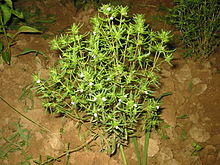| Summer savory | |
|---|---|

| |
| Scientific classification | |
| Kingdom: | Plantae |
| Clade: | Tracheophytes |
| Clade: | Angiosperms |
| Clade: | Eudicots |
| Clade: | Asterids |
| Order: | Lamiales |
| Family: | Lamiaceae |
| Genus: | Satureja |
| Species: | S. hortensis
|
| Binomial name | |
| Satureja hortensis | |
| Synonyms | |
|
Ground Savory | |
Summer savory (Satureja hortensis) is among the best known of the savory genus. It is an annual, but otherwise is similar in use and flavor to the perennial winter savory. It is used more often than winter savory, which has a slightly more bitter flavor.
This herb has lilac tubular flowers which bloom in the northern hemisphere from July to September. It grows to around 30 to 60 cm (1 to 2 ft) in height and has very slender, bronze-green leaves.
The plant is called مرزه (marzeh) in Persian, Bohnenkraut in German, bonenkruid in Dutch, sarriette in French, santoreggia or paverella in Italian, segurelha in Portuguese, ajedrea in Spanish, θρούμπι (throúbi) in Greek, cząber in Polish, чубрица (chubritsa) in Bulgarian, cimbru in Romanian, borsikafű in Hungarian, чубар (čubar) in Serbian, чабер (chaber) in Ukrainian, жамбил (jambil) in Uzbek, and mercimek otu in Turkish.